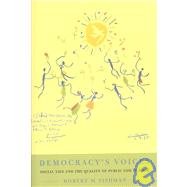Democracy's Voices
, by Fishman, Robert M.- ISBN: 9780801442261 | 0801442265
- Cover: Hardcover
- Copyright: 5/1/2004
Building on one of sociology's core ideas-that social ties can shape collective outcomes-Democracy's Voices shows that connections across class boundaries can remake public rhetoric and thus the quality of democratic life. Robert M. Fishman takes up a question of enduring significance to people concerned with the quality of democratic public life, focusing on why political rhetoric proves engaging and broadly relevant, or disengaging and narrow. The answer to that question, he argues, is to be found not only in the deeds of prominent politicians and the nature of official institutions but also in the existence and the character of social connections among ordinary citizens. Fishman's book, based on long-term fieldwork and systematic survey research in Spain, identifies the special contribution to democratic quality made by conversations between intellectuals and workers. Fishman focuses on what he calls the "discursive horizons" of local leaders and communities: the actual location of the problems and proposed remedies articulated in political rhetorics. Democracy's Voices shows how the subcultural context of social ties may accentuate or diminish their power to reshape rhetorics. Fishman argues that conversations are able to remake public rhetorics whereas ties that take the form of brokerage lack that ability. The book also offers a general critique of social capital theory and argues that the full ability of social ties to shape collective outcomes can only be observed when one distinguishes in useful ways among types of ties.






